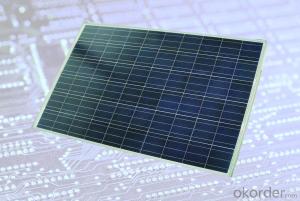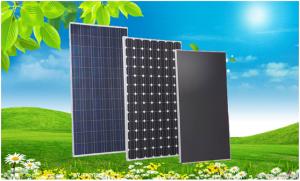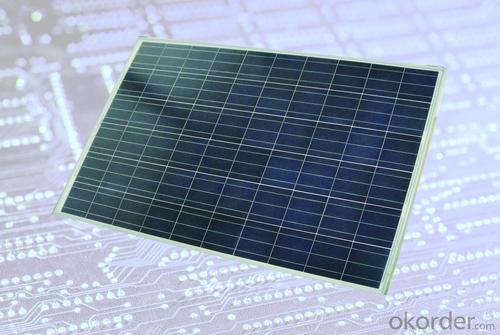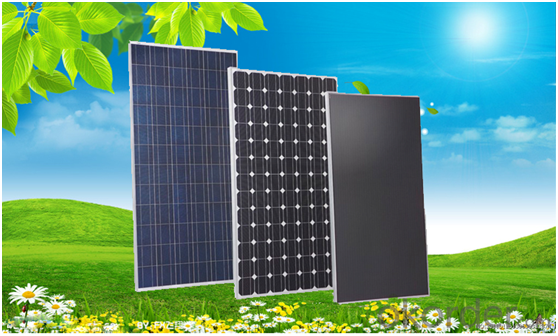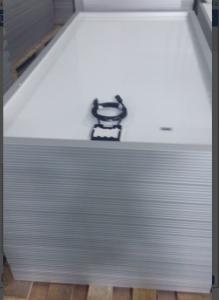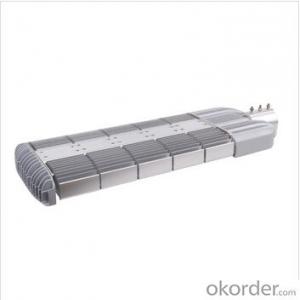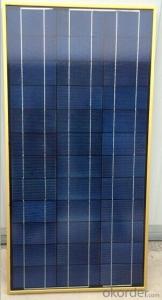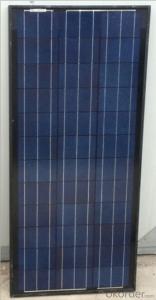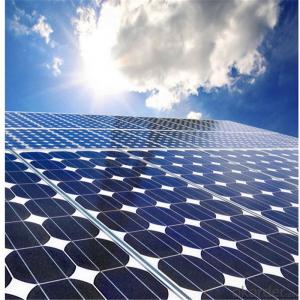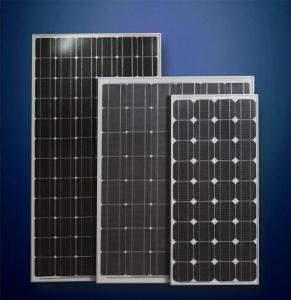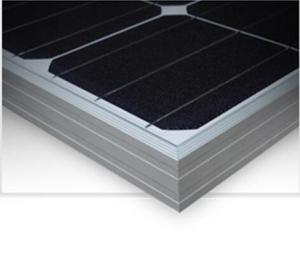Longi Solar Panels - Polycrystalline Silicon Photovoltaic Component 70W
- Loading Port:
- Shanghai
- Payment Terms:
- TT or LC
- Min Order Qty:
- 1 watt
- Supply Capability:
- 9999999 watt/month
OKorder Service Pledge
OKorder Financial Service
You Might Also Like
Descripiton:
Polycrystalline silicon photovoltaic products
There are nearly 20 kinds of current polysilicon component blue sky sunproduction, power ranging from 45W to 300W, details please refer toannex "polysilicon component parameter table".
The products have obtained CE certification, CQC certification, TUV certification.
Company information:
CNBM Solar is a world-leading and Vertical integrated manufacturer of high-performance with Silicon,
Wafer, Cells, Modules, which convert sunlight into electricity for residential, commercial, and utility-scale
power generation.
The capacity of CNBMSolar is reach to 1GW, and make sure each year our shipment capacity is more
Than 700-800MWs, at the same time, we have set up the largest solar power station with our partner
in Ukraine.
CNBM is a Quality + Service oriented company with“Excellence at Each Step” approach, composed of
the finest components from TUV and IEC-certified partners around the world, CNBM modules consistently
undergo a variety of trials at the company’s Test & Development Centre, ensuring peak performance
capabilities. The company is committed to develop and provide the world with clean and renewable energy
to ease the energy shortages as well as human kind’s impact on the environment.
Model Type | Good Quality 185W Solar Panel |
Peak Power-Pmax(W) | 185W |
Open Circuit Voltage-Voc(V) | 44.2 |
Maximum Power Voltage-Vmp(V) | 36 |
Short Circuit Current-Isc(A) | 5.4 |
Maximum Power Current-Imp(A) | 5 |
Maximum System Voltage | 1000V DC |
Maximum Series Fuse Rating | 10A |
Power Tolerance | -1~+3% |
Temperature Coefficients of Pmax | -0.45%/℃ |
Temperature Coefficients of Voc | -0.348%/℃ |
Temperature Coefficients of Isc | 0.031%/℃ |
Nominal Operating Cell Temperature | 44.5±2℃ |
Standard Testing Condition(STC) | Irradiance:1000W/m²;Temperature:25℃;AM=1.5 |
Qualification Test Parameters | |
Operating Temperature | -40℃~+85℃ |
Storage Temperature | -40℃~+85℃ |
Pressure Bearing | ≥5400Pascal/m² |
Wind Bearing | ≥5400Pascal/m² |
Mechanical Characteristics | |
Cell Size | Mono 125*125mm±0.5 |
No.of Cells | 72pcs(6*12) |
Dimension | 1580*808*40mm |
Weight | 15.5Kg |
Glass | 3.2mm High Transmission,Low Iron |
Frame | Anodized Aluminum Alloy |
Junction Box | IP65Rated |
Internal Diodes | 3 Bypass Diodes |
Cable | 1*4.0mm² Length 900mm |
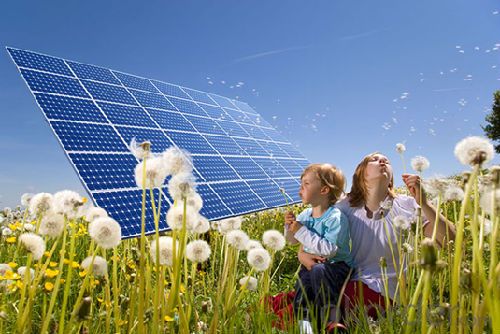
FAQ:What's the products warranty?
Products Guarantee 12 yrs free from defects in materials and workmanship Performance Guarantee No less than 90% within 10yrs and no less than 80% within 25yrs
- Q: Can solar panels be installed on fences?
- Yes, solar panels can be installed on fences. In fact, fence-mounted solar panels have become increasingly popular as they provide an additional space for generating renewable energy without consuming valuable land.
- Q: My house is aligned exactly North-South, so I have no roof facing South. Is it worth installing solar panels? Are there any good options for dealing with this situation?
- In your case you will need twice as many panels. This is because the panels on the west side of the roof will be in shade in the morning and the panels on the east side of the roof will be in shade in the afternoon, and a solar panel in the shade makes no power, or at least very little power. So right there you doubled the cost of an already too expensive system. Or you could build special stands to hold the panels facing south. It would be cheaper to just move to a house with better alignment!
- Q: Hi. I have been looking into getting solar panals but I only want them for one room. See, we're expanding the house by adding a basement, the basement isn't going to be that big but we wanted to have solar energy for the basement only. Could anyone give me a rough estimate on the cost of solar panals for my basement?
- Only after you give an estimate of the power consumption you will have in the basement. Obviously you do not have a clue about solar panels or their usage. Suggest you find a book and start reading.
- Q: Can solar panels be used in areas with high pollution?
- Yes, solar panels can still be used in areas with high pollution. While pollution can reduce their efficiency to some extent, solar panels can still generate electricity even in polluted areas. However, it is important to note that excessive pollution may result in a decrease in their overall performance and require more frequent maintenance to keep them clean and functioning optimally.
- Q: I want to use this solar panel to hook up AC adapters. IM not sure what to do and how to use the solar panel. I want to be able to use a batter charger, a radio, and charge a GPS if needed. - Thanks, Zoo
- Most radio's have a DC plugin port. You can build or purchase adapters that step down the 2 V power to the radio's power needs. In short, power your devices directly from the solar cell using the car adapter plugs made for them or charge a larger battery as a power resevoir and plug your car adapters into it when it is dark which allows you to charge devices when you are not using them while sleeping.
- Q: What is the warranty on solar panels?
- The warranty on solar panels can vary depending on the manufacturer and the specific product, but it typically ranges from 10 to 25 years.
- Q: Can solar panels be installed on bus stops or shelters?
- Yes, solar panels can be installed on bus stops or shelters. In fact, many cities around the world have already implemented solar-powered bus stops and shelters as a sustainable solution to provide clean energy and reduce the environmental impact of public transportation systems. These solar panels can generate electricity to power lighting, information displays, charging stations, and even provide energy back to the grid.
- Q: Can solar panels be installed on a rental property?
- Yes, solar panels can be installed on a rental property, but it would require permission from the property owner or landlord.
- Q: I've been thinking and I'd like to have solar panels installed on my roof at some point to help reduce our electricity consumption- but I live in IL and in the winter it frequently snows. Is there such a thing as heated solar panels so they don't get coated w/ice or snow? Are solar panels even a feasible option in IL? Thank you, Anna
- With state incentives that rank behind only a few states (such as the ones typically associated with solar like Florida and California) somebody definitely thinks solar is right for Illinois. (source is first site below) As for the ice and snow the typical strategy is to have a tilt that allows for only limited accumulation and still has good orientation to the sun. This is frequently talked about in articles in the magazines Homepower and Solar today. Homepower has a site online and some items are free (2nd site) Good Luck
- Q: i have a fountain system that has a small electric pump. its made to be close to a house but i want it across the driveway and i dont want to run electrical over there.is there a small solar panel that i can get fairly inexpensive to mount on a nearby tree and be able to plug the pump into it?
- More okorder /... (... or search portable solar panel) And probably under a tree isn't a good placement for a solar panel. Good luck!
Send your message to us
Longi Solar Panels - Polycrystalline Silicon Photovoltaic Component 70W
- Loading Port:
- Shanghai
- Payment Terms:
- TT or LC
- Min Order Qty:
- 1 watt
- Supply Capability:
- 9999999 watt/month
OKorder Service Pledge
OKorder Financial Service
Similar products
Hot products
Hot Searches
Related keywords
